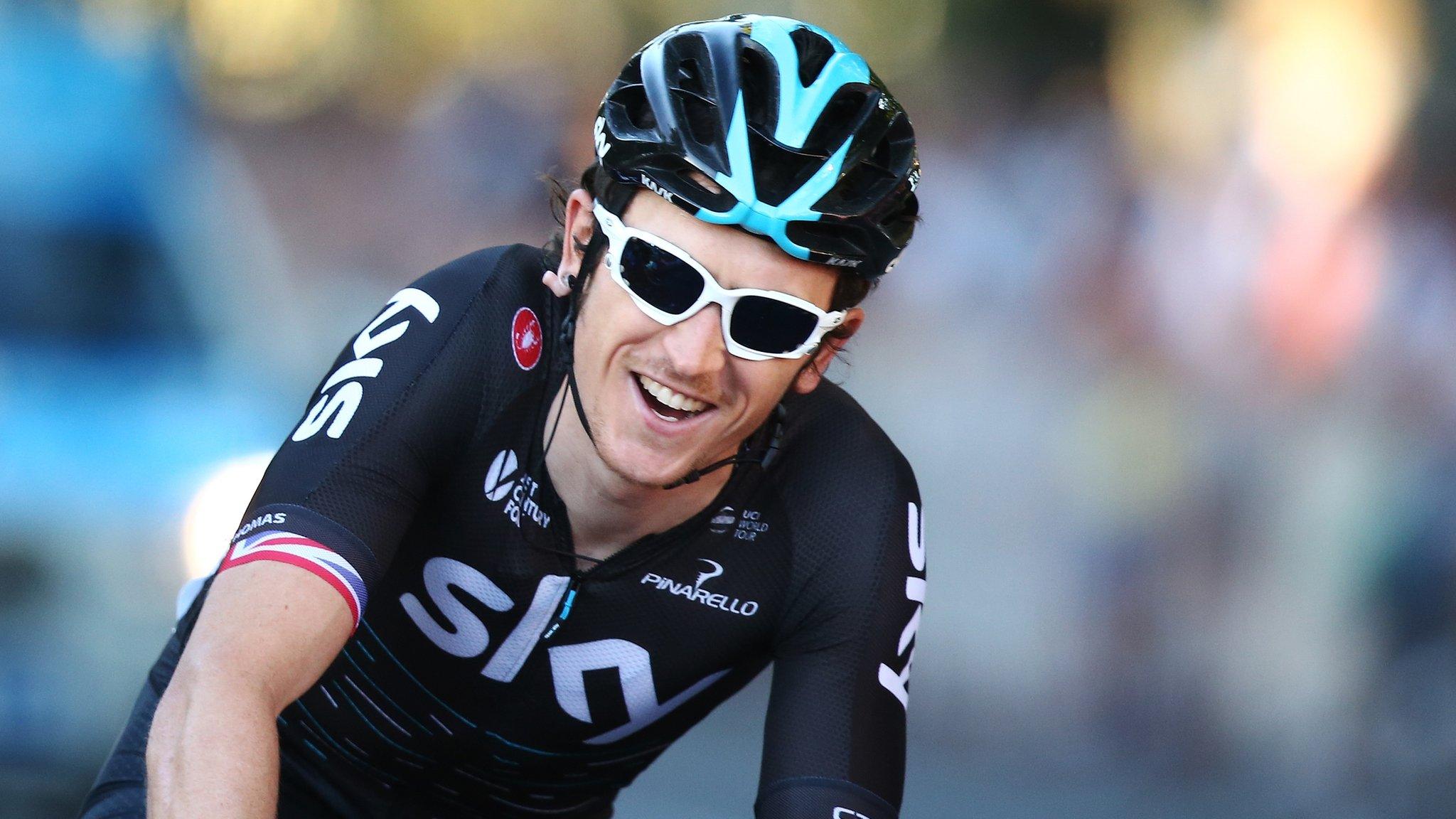Tour de France 2017: Will Chris Froome win fourth title in five years?
- Published
- comments
Froome ready for 'biggest challenge'
Tour de France, 1-23 July |
|---|
Coverage: Live text commentary of every stage on the BBC Sport website. Radio 5 live coverage on Sports Extra and/or website from 14:30 BST on every stage |
The 104th edition of the Tour de France will have to go some way to beat the extraordinary scenes of last year.
The sight of race leader Chris Froome running up Mont Ventoux, frantically searching for a bike, any bike, to replace his mangled machine which lay strewn on the mountain will live long in the memory.
So too will fellow Briton Adam Yates' misfortune when the 1km to go inflatable collapsed on him during stage seven.
And so too will the seven stage wins by British riders - including four for Mark Cavendish - matching the record set in 2012.
What stories will this year's race, which starts on Saturday and runs for three weeks across 3,540 kilometres (2,200 miles), throw up?
Will Froome complete his third straight win and a fourth victory in five years? Will Cavendish become the leading stage winner of all time? Will we finally see a French winner after a 31-year drought?
Where does the race go?
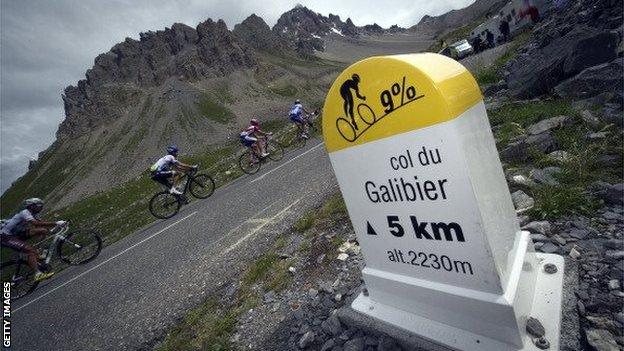
The highest point in this year's race comes atop the Col du Galibier at 2,642m and the first to reach its summit will be awarded the Souvenir Henri Desgrange - named in honour of the race's founder
A total of 198 riders from 22 nine-man teams will set off on the 21-stage race. It takes in four countries and features two individual time trials, nine flat, five hilly and five mountainous stages.
And race organisers appear intent on breaking Team Sky's recent dominance, which has been characterised by their ability to control the pace of the race. The mountain climbs are generally shorter and steeper, while two short individual time trials should not allow Froome to gain too much on his challengers.
The German city of Dusseldorf hosts the opening individual time trial and the start of stage two, which finishes in Liege, Belgium.
Dusseldorf stepped in after an abrupt U-turn from Transport for London scuppered a bid for the race to start in the English capital.
From Belgium, the race heads through Luxembourg and on into north-eastern France and then south towards the Alps to end week one.
A rest-day transfer to the Dordogne region in the west is followed by a second week dominated by the Pyrenees mountains before the Alps take centre-stage for the final week.
For the first time since 1992, the race visits all five of France's main mountain ranges, but there are just three summit finishes.
Will Froome win?
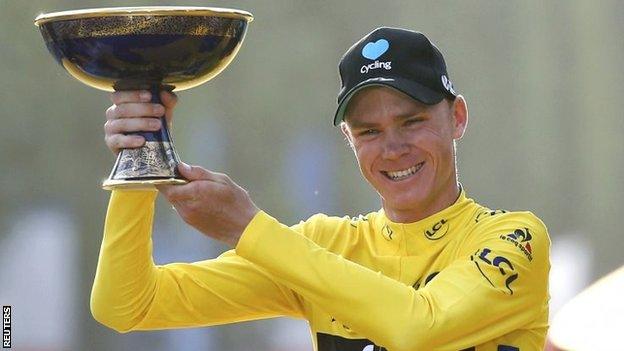
Since Sir Bradley Wiggins won Britain's first Tour title in 2012, Froome has won three in four years
The man himself says he is "fresher" than he has ever been but he goes into the race without a victory in 2017. The 32-year-old's three Tour triumphs were all preceded by winning the traditional Tour warm-up, the Criterium du Dauphine, but he only finished fourth this year.
Froome concedes that "this year's Tour suits Richie Porte really well", while his own Team Sky race director Nicolas Portal says they will have to "find a new way to win" because the race features fewer individual time trialling kilometres - just 37.5km - than ever before and fewer mountain climbs and summit finishes than last year.
Still, it's hard to back against him.
He will expect to be stronger than his main rivals in the two races against the clock - on stages one and 20 - and he has eight team-mates who are well-versed in looking after their leader, keeping him out of trouble on sprint stages and delivering him to the foot of mountain climbs in the perfect position.
The first big test for those hoping to challenge will come with the summit finish at La Planche des Belles Filles on stage five. If that mountain sounds familiar, it's because Froome won his first Tour stage there in 2012.
The ability to descend quickly is also going to play a huge part in this edition, with three stages finishing at the bottom of mountains.
Prior to last year's race, Froome was not considered as one of the sport's best at going downhill - but he answered his critics in fine style with a winning attack on stage eight that put him in the yellow jersey.
Belgian Eddy Merckx, Miguel Indurain of Spain and French pair Bernard Hinault and Jacques Anquetil have won a joint-record five Tours de France each. A fourth victory for Froome will elevate him to fifth on the list and cement his place among those legends.
Froome's main challengers
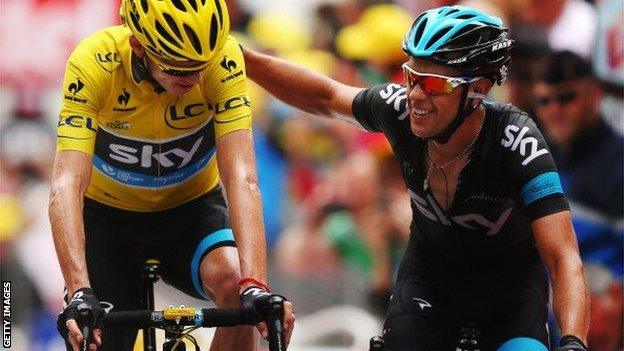
Richie Porte (right) was one of Froome's key domestiques when he won the 2015 Tour de France
Former Team Sky team-mate Richie Porte is the man in form this year, winning a couple of early-season stage races and finishing second in the Criterium du Dauphine.
However, whether the 32-year-old Australian has the legs for the three-week test ahead is debatable. He took over as Team Sky's leader when Froome pulled out after a crash in 2014, but he struggled in the high mountains and finished 23rd.
His best result was last year's fifth but the BMC Racing rider tends to have one bad day that destroys his chances.
Nairo Quintana is one of the few who can ride away from Froome in the mountains and the paucity of time trialling this year race will also help the 27-year-old Colombian's cause - but he needs to be more aggressive.
It will be interesting to see if the Movistar rider, who has twice finished runner-up to Froome (2013 and 2015) is helped or hindered by competing in Italy's equivalent race, the Giro d'Italia, where he finished second in May.
Should Quintana fade, Movistar have Spanish veteran Alejandro Valverde in their ranks. The 37-year-old won his home tour - the Vuelta a Espana - in 2009 and has had seven other podium finishes, including third at the 2015 Tour.
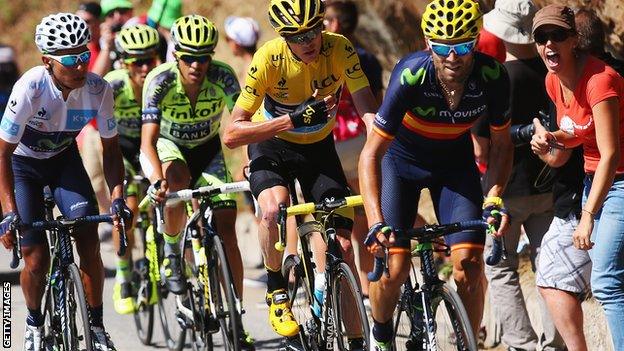
Will Quintana, Contador or Valverde be strong enough to break Froome in the mountains?
Alberto Contador has won all three Grand Tours at least twice, but while the 34-year-old Spaniard is not as feared as he once was, he will be a marked rider.
Expect dancing on the pedals and sharp attacks in the high mountains as the Trek-Segafredo rider tries to shake up those chasing podium places.
Italy's big hope for the race is Fabio Aru. The Astana man is only 26 but his aggressive riding in the mountains helped him win his solitary Grand Tour to date - the 2015 Vuelta.
He has a super-domestique in Jakob Fuglsang and the Dane is in terrific form, having attacked on the final stage to beat Porte at the Dauphine. However, the 32-year-old's ambitions of a podium finish will be tempered by Aru's progress.
What price a French winner? Home fans will not need reminding that they have had little to celebrate since Bernard Hinault's victory back in 1985.
Romain Bardet carries the weight of the nation's expectations this year. The 26-year-old AG2R-La Mondiale rider finished runner-up to Froome in 2016, but he was more than four minutes adrift. Again, a lack of individual time trials will help the climbing specialist, but can he take on Froome in the high mountains?
Can Cav catch Eddy?
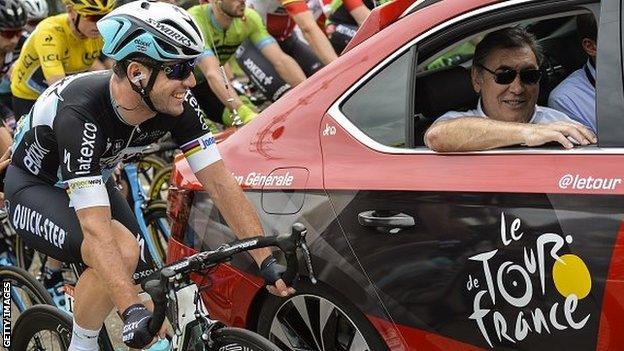
Mark Cavendish will never win the Tour de France, while Merckx (right) won the race a joint-record five times
From a British point of view, the most interesting sub-plot in a race that always features many, will be whether Cavendish can equal, or even surpass Belgian legend Eddy Merckx's record of 34 Tour stage wins.
The 'Manx Missile' starts his 11th Tour on 30 and in half of the previous 10 he has won at least four stages.
And with nine designated 'flat' stages this year, you would think there would be ample opportunity for the team Dimension Data sprint specialist to add to his tally.
However, the 32-year-old has missed three months of this year after being diagnosed with glandular fever, caused by the Epstein-Barr virus.
Cavendish returned in the Tour of Slovenia in mid-June and also rode in the British national championships, on the Isle of Man.
But he said of his inclusion in this year's race: "If I am being totally honest, had this not been the Tour de France we may have collectively taken a different approach."
Having written all that, Cavendish went into last year's race unsure of his form after spending much of the year training for an Olympic medal tilt on the track in Rio and he went on to claim his first yellow jersey and four stage wins.
Who can stop Cavendish?
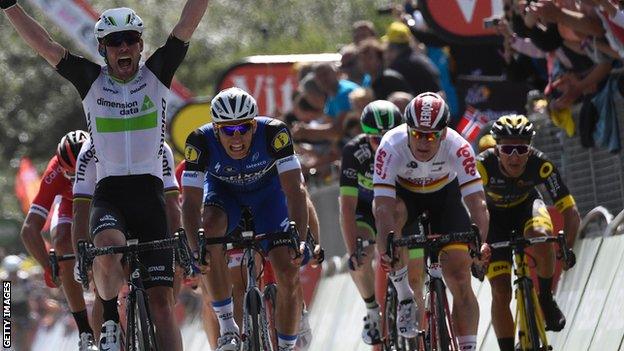
Cavendish won stage one last year, beating Kittel (centre) and Greipel, to claim his first yellow jersey
German sprinters Andre Greipel and Marcel Kittel are the most likely candidates.
A former team-mate of Cavendish, Greipel has won 11 Tour stages, while Kittel has picked up nine.
Also keep an eye out for 24-year-old rising star Dylan Groenewegen. The Dutchman had three top-10 finishes on his Tour debut last year and Tour de Yorkshire fans will recognise his name after he won stage one in 2016 and 2017.
National road champion Arnaud Demare, 25, and 26-year-old Nacer Bouhanni are the French hopes. Bouhanni, you may recall, had to withdraw from last year's Tour after injuring his hand in an altercation, external at a hotel.
The race for green
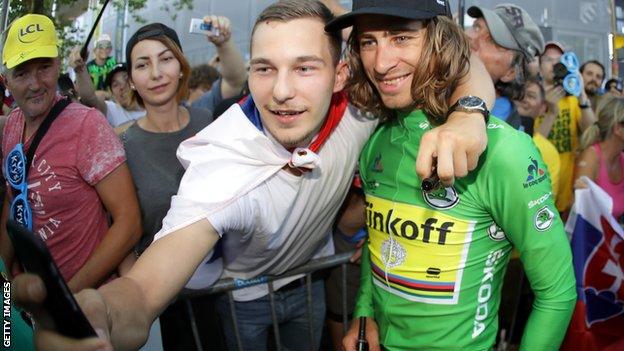
Sagan's aggressive style of racing has endeared himself to fans
Slovakia's Peter Sagan is favourite to retain the green points jersey that he has won in such entertaining fashion for the past five years and equal Erik Zabel's record.
The classification rewards consistently high finishes on each stage and because Sagan has a rare ability to mix with the sprinters and tackle minor climbs he has dominated the classification since Cavendish took the title in 2011.
However, race organisers also appear keen to stop Sagan's fun and give the pure sprinters more of a sniff.
Will Sagan find a way of accumulating enough points? The race for green should keep the Tour interesting on days when Froome and his rivals are busy reserving their energy for the mountains.
Any other Brits in the race?
Yes. Seven.
Welsh duo Geraint Thomas and Luke Rowe will be part of Team Sky's nine-man squad.
Thomas is riding in his eighth Tour, having been a key domestique for Froome in each of his three previous wins. He had been Team Sky's leader in May's Giro d'Italia but his race was ultimately ended by a crash involving a police motorbike.
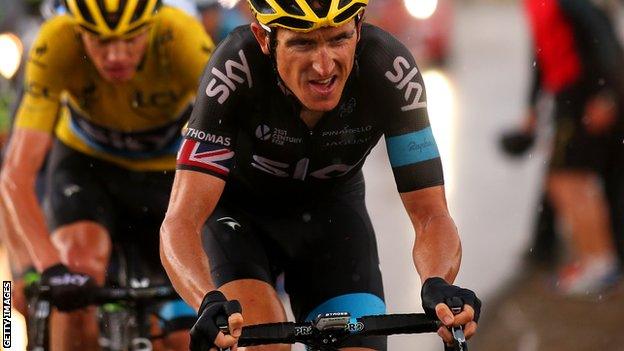
Thomas will again be one of Froome's main helpers in the mountains
Joining Cavendish in Team Dimension Data are Yorkshireman Scott Thwaites and newly crowned national road race and time trial champion Steven Cummings. The 36-year-old has won two Tour stages, including a solo victory last year.
Simon Yates will share Tour leadership duties for Orica-Scott. The 24-year-old climber won a stage and finished sixth in the 2016 Vuelta a Espana. Will he emulate his twin brother Adam, who won the white jersey as best young rider in 2016?
Sprinter Dan McLay, who impressed with four top-10 finishes on his Tour debut last year, returns with the Fortuneo-Vital Concept team, while former Sky rider Ben Swift will be racing for UAE Team Emirates.
Tour de France, 1-23 July |
|---|
Coverage:Live text commentary of every stage on the BBC Sport website. Radio 5 live coverage on Sports Extra and/or website from 14:30 BST on every stage |
- Published28 June 2017
- Published29 June 2017
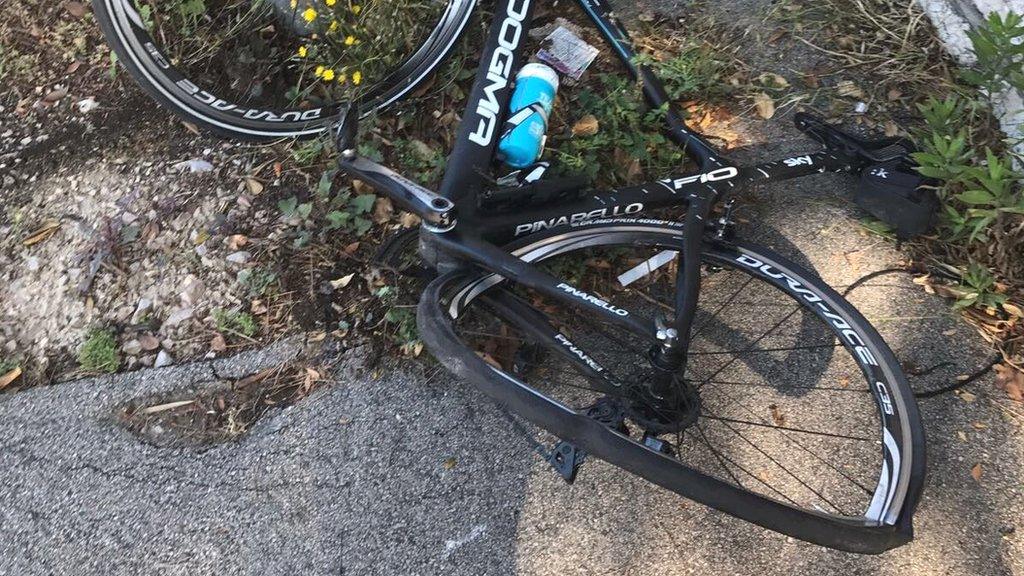
- Published26 June 2017
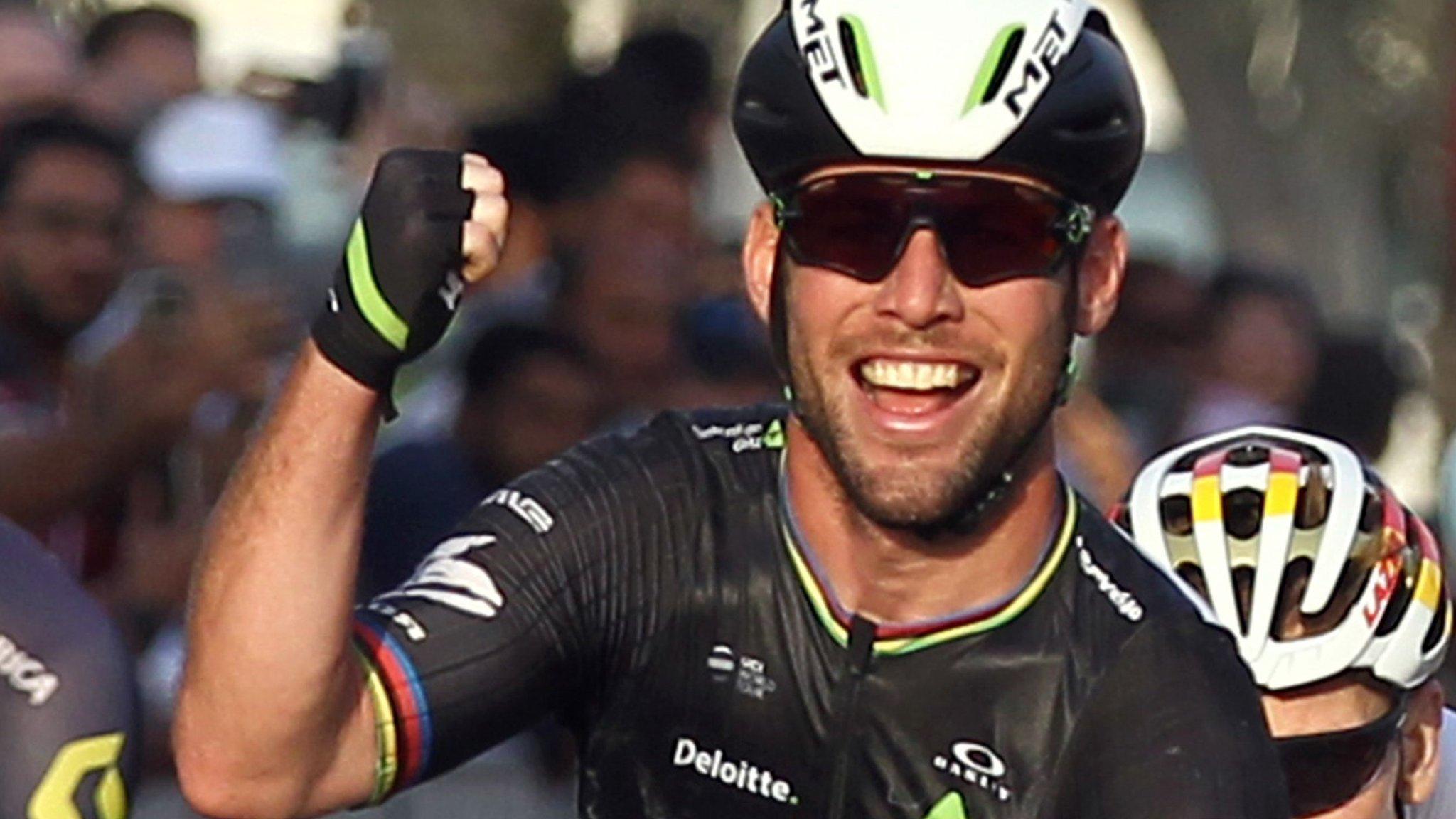
- Published22 June 2017
